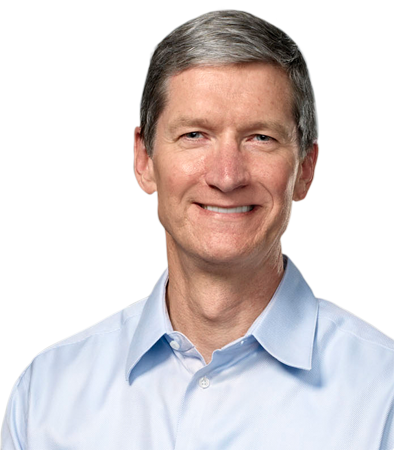Apple’s Tim Cook, Google’s Eric Schmidt Talk Past Each Other On Privacy And Security
After the major "iCloud hacking" scandal involving some celebrity iCloud accounts being hacked, which also led to the discovery that you could get anyone's data remotely as long as you either knew or brute-forced their password, Apple CEO Tim Cook did an interview with Charlie Rose where he said that Apple cares much more about the users' privacy than a certain competitor (referring to Google). Cook said that his company can afford to have strong privacy protections because it's not in the business of selling or mining people's data (unlike Google).
He made a great point, although his emphasis on privacy was a response to people wondering how secure Apple's services or devices are; thus, Cook answered a question he wasn't asked.
Privacy and security aren't always interchangeable. A company can be focused on protecting data against hackers but still track all user behavior. On the other hand, a company can decide not to track all that user data, but it may still have products and services with poor security that can easily be hacked by others.
Apple was asked about its security but answered about the privacy of its devices, with Tim Cook also saying in an open letter on the company's website last month that:
"We don't build a profile based on your email content or web browsing habits to sell to advertisers. We don't "monetize" the information you store on your iPhone or in iCloud. And we don't read your email or your messages to get information to market to you."
In a recent interview with CNN Money, Eric Schmidt responded to Tim Cook with this statement:
"We have always been the leader in security and encryption. Our systems are far more secure and encrypted than anyone else, including Apple. They're catching up, which is great."
Get Tom's Hardware's best news and in-depth reviews, straight to your inbox.
Just as Tim Cook did, we see Eric Schmidt give a different response to a question he was asked about Google. This time, though, it's the other way around. Schmidt responded with a statement about "security and encryption," while Tim Cook was specifically referring to issues about privacy and data mining.
Apple is clearly targeting this privacy aspect because it's something it can afford to do. The company has a business model that doesn't depend on advertising. It is a weakness that Google has that it can't easily fix, because that's how the company makes most of its money. Apple is smart to position itself against Google as a more privacy-friendly company.
On the other hand, Eric Schmidt, referring to the security of Google's services, is also right. Google has a history of pushing for encryption on the web, from adopting HTTPS to supporting two-factor authentication for its own services. In many of these cases, Google has been one of the first in the industry to implement a given solution. As Schmidt also said in the CNN Money interview, Google doesn't have a history of major data breaches, and that's thanks to its focus on security for its services.
The company has recently ramped that up with many new security-oriented projects such as Project Zero, Simple Security, encrypting data at rest to protect against NSA breaches, increasing the search ranking for HTTPS-enabled websites and more.
Both companies are also making some efforts to improve their own weaknesses -- Apple in the security of its services, Google in privacy. Apple has recently adopted two-factor authentication for iCloud, along with some other features that should make it harder for others to breach iCloud accounts. Google, meanwhile, has started working on projects such as End-to-End, an e-mail add-on that can encrypt messages so that even Google can't see them. This is something many would have thought unthinkable a couple of years ago, because it can potentially impact Google's revenue if too many people use it.
This competition on the privacy and security fronts should encourage Apple and Google to improve their security and privacy policies for the benefit of their users; it should also nudge other companies to do the same.
Follow us @tomshardware, on Facebook and on Google+.
Lucian Armasu is a Contributing Writer for Tom's Hardware US. He covers software news and the issues surrounding privacy and security.
-
therogerwilco Apple has lost their glimmer.Reply
People are seeing them for the money-grubbing company they are. -
irish_adam Are we ever going to have a comment system that actually works? i had to go to the forum to be able to post on this article.Reply
anyways, i dont like that you called googles whole business model a weakness, its that model that has made it the giant it is today. Google has never hidden from the fact that it uses your data to provide those free services you use so whats the problem? dont like it? then go pay for a premium service. Apple and Google both operate on very different business models, it was a pathetic cheap shot from Tim Cook, especially considering Apples screw ups in the past when its come to security -
turkey3_scratch Neither are very secure, look at Gmail accounts getting hacked, and iCloud. We can trust Ubuntu however, and I'd consider Microsoft safe (though hackers tend to go toward it).Reply -
ldo Glad to see a journalist actually understand what they are reporting, rather than uncritically regurgitating quotes to try to appear “fair and balanced”.Reply -
psiboy This Lunacy from Tim "Crook" at Apple.. a company that only a few years ago was saying "you can't get a virus on a Mac". The man is a retarded Ostrich with his head in the sand. I deal with the public for IT every day and the idiocy of the "no virii on a mac" is something I still have to correct with "Joe and Jill public". Irresponsible and over priced is all Apple has ever been. As another commenter posted, Google have been up front from day 1 unlike Apple the great "deceptiCON" :PReply -
psiboy This Lunacy from Tim "Crook" at Apple.. a company that only a few years ago was saying "you can't get a virus on a Mac". The man is a retarded Ostrich with his head in the sand. I deal with the public for IT every day and the idiocy of the "no virii on a mac" is something I still have to correct with "Joe and Jill public". Irresponsible and over priced is all Apple has ever been. As another commenter posted, Google have been up front from day 1 unlike Apple the great "deceptiCON" :PReply -
Anakha00 Where was the proof of any Gmail accounts being hacked Turkey3? If you're referring to the 5 million "hacked" email addresses with passwords, there was never any confirmation that actual matching account/password combinations were taken from Google. In fact there were many sources that pointed towards the accounts(gmail addresses)/passwords being taken from other sites, the only problem is that many people don't use different passwords for different accounts, which one can hardly blame Google for now can they?Reply
As for the article, well I can't remember the last time Google forced me or anyone else to click on an ad to buy something. Seems to me Apple is trying their best to make people forget about a very public security issue at the time of their new product release. Not saying that if these celebrity's Google accounts had been targeted they would be secure still, but Apple put them into that situation in the first place because their products, while convenient for a casual user, uploaded these pics to the cloud as backups. Let's face it, Apple is as big as they are in the 21st century because Steve Jobs was smart enough to improve on clunky product designs for the casual user, unfortunately those improvements had nothing to do with security and now hackers are taking advantage of it. -
therealduckofdeath Apple in a nutshell: Gets an uncomfortable question about their flawed products, tries to shift focus to a different company.Reply
Had Tim Crook not been working for Apple, he would have been a corrupted politician today. -
ScottWLovesYou Apple iCloud got hacked three times. Google has never been hacked. Eric Schmidt is respectful and mature. Tim Cook acts like bitchy cheerleader #4 from some Meangirls copy.Reply

